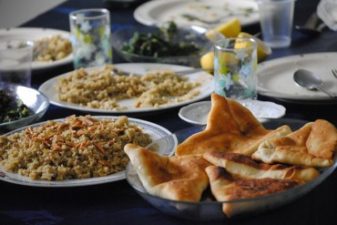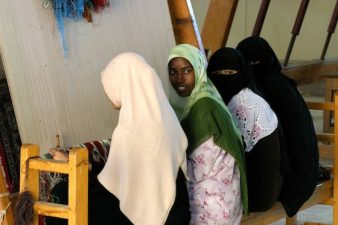 New parents and nursing Muslim women will be pleased to know the Islamic perspective on nursing is pro-breastfeeding. And it doesn’t cost the Earth.
New parents and nursing Muslim women will be pleased to know the Islamic perspective on nursing is pro-breastfeeding. And it doesn’t cost the Earth.
At Islam’s core of a stable society is a functioning family where, interestingly, the mother has a higher status than the father. And for a family unit to be healthy, mothers are given the greatest responsibility for nurturing the next generation. Breastfeeding is a greener, more eco-friendly and wholesome feeding method for mother, baby and environment.
Islam encourages mothers to breastfeed their new babies as it develops a better maternal bond, so much so that prophetic teachings (hadith) state that each gulp of milk the baby takes counts as an act of charity and reward for nursing mothers.
It is difficult though, for newly mothers to leap into feeding with ease when Muslim cultural values or even the woman’s own self-evaluation, puts the whole process to question.
Under the umbrella of Islamic parenting, a pregnant and breastfeeding woman is closer to God and she is exempt from fasting during Ramadhan – the month of fasting (Qur’an, 2:185).
The Islamic Shari’ah (rules and regulations) even states that a husband has the right to ask his wife to breastfeed their children because of the health benefits it nurtures. Breastfeeding prevents infections, allergies to foods, and some reports say it is connected to an increase in children’s IQ.
The breastfeeding period could be around two years therefore a light-hearted attitude is adopted by Muslim women who try nursing any longer than one; weaning babies onto the bottle too early affects their growth and well-being.
Basically, the longer a mother breastfeeds the better, especially in the first 6 months and mentioned in the Qur’an (46:15).
Do Muslims breastfeed in public?
Yes, they do. For a majority of countries in the West, breastfeeding in public has become an uncomfortable topic. While Islamic etiquette stands by the Muslim covering of hijab, which is translated as a headscarf, a full burqah or jilbab (full length tunic) for women, there is no ruling against a mother feeding in public, so long as she is covered appropriately.
This attitude varies from Muslim country-to-country and unknown to most, it is more accepted in Middle Eastern countries.
British Muslim women do nurse their infants at social gatherings and family events, behind a curtain or in another room, but both British character and the weather means they will not be breastfeeding on a park bench any time soon!
Myths of breastfeeding
- “Baby formulas are almost the same as breast milk” – Such claims have been made by advertisers but formulas do not contain the enzymes and immune cells found in breast milk. Formulas actually contain too much protein and minerals needed for the baby.
- “Breastfeeding hurts” – Although some mothers may experience some tenderness at first, pain may be due to an infection or the baby latching on poorly. It does get easier as the baby grows and is used to feeding.
- “Many women cannot produce enough milk” – Most women do produce more than enough milk. If the baby has difficulty breastfeeding it may be poorly latched to the breast.
- “Breast milk doesn’t contain enough iron and vitamins” – Not true! Breast milk contains all of the vitamins a baby needs, including vitamin D. There is also enough iron in breast milk to last for the first six moths after birth.
Breastfeed to save the environment
Breastfeeding cuts out at least a whole year’s cost of mass manufactured teats, bottles and powdered formula. Think about it, you use less water in washing and sterilising your baby’s bottle, all those plastic teats and tinned formulas – which are not all bio-degradable – means less pollution and a greener living.
Immune cells are passed from the mother to the baby only through breast milk, giving stronger immune systems to children than formula milk. Breastfeeding decreases the risk of milk and food allergies, mothers usually lose weight faster than mothers who do not breastfeed. For this it is recommended to begin breastfeeding immediately.
Breastfeeding takes time to get into a rhythm but the intuition of both parent and child creates a signal so the mother knows when her baby is hungry. It is good for emotional and mental health, and it lowers the risk for postpartum depression and anxiety.
In the interest of self-preservation and the Earth, breastfeed your baby.
Read more on breastfeeding:
Breastfeed Your Baby in a Hijab
World Breastfeeding Week on “Baby Friendly” Policies
Image :: Kupih




I enjoyed your article. I am not muslim and I was curious as to how nursing in public is viewed within the muslim community. I am shocked by how “offended” people in the United States are about nursing in public whether covered or not. Yet very sexually provacative images are everywhere all the time. Breastfeeding your child is not a sexual act and a bit of breast showing is not sexual either and yet it is made to be “dirty” or offensive. I for one feel more comfortable being covered but I do not judge those who don’t because you can’t see anything anyways. If you can nurse it’s the best, if you can’t for some reason you are no less of a woman or mother. Mother’s from every walk of life and religion need to support eachother and not judge harshly. Anyways, thank you again for your article. I’m glad I found your page. 🙂
If only there were adequate resources. If you are a mom who struggled, you learn the hard way on this one. Remember, years ago, most women didn’t breast feed their own children. They had wet nurses who did this.
Sometimes, no amount of reading before hand will overcome some challenges, like nipples and palates that just don’t match. If you’ve had this experience with your child, and tried all the contraptions (nipple guards, syringes, cheek rubbing, palm rubbing, etc) you’d know this too.
Breastfeeding is wonderful. It serves an amazing purpose. But those who can’t do it for legitimate reasons need not be made to feel inadequate.
And stress? That’s counterproductive and is known to actually diminish a woman’s amount of milk. Give the poor gal a bit of dark beer, she and her milk production will be better for it.
Yes, the good points are endless. And we mustn’t lose sight that sometimes, it just doesn’t work. When that happens chances are overwhelming that mom and baby will do just fine. Those who dont’ breastfeed according to everyone’s standards shouldn’t be ostracized for their choice.
As for pumping milk, the use of the bottles is comparable to formula-fed babies. The rental equipment uses electricity, unless of course mom is using a hand pump, which should never, never be recyled and used for another woman (something that also ends up in landfills, I suppose).
Unless a woman is exclusively breastfeeding, she’s not environmentally neutral.
Bonding via breastfeeding is amazing, and is as much about the eye contact as the latch. Please don’t minimize that for those moms who don’t breastfeed.
Endorse breastfeeding. It’s an experience unlike any other. Please, also allow space for mothers who don’t. They are as committed to the wellbeing of their children.
While I appreciate your motives, I think there are several misperceptions perpetuated in this piece. First of all, breastfeeding alone won’t save mother earth. That’s a bold statement to make, and there are many other behaviors that need to be addressed in the muslim communities before you can claim that. For example, the indiscriminate tossing of trash out the windows…but I digress.
On the topic of breast feeding. First of all, there are many formulas that have less protein, minerals, etc., so to minimize the value of alternative milk sources for this reason is a moot point.
Secondly, your suggestion that breast feedling continue for 2 years is offered in such a way as to suggest that anything less is invalid. There are many fine, healthy and contributing members of society today who were never breast fed. Granted, mother’s milk is nature’s best alternative (cheaper too as you mention), but second best isn’t failure. Nor is doing it for less time, or even supplementing breast milk.
As for all those bottles, no mention is made of the resources used to pump and store mothers milk. That adds up, and must be included in a discussion on the environmental benefits/challenges associated here.
Finally, you COMPLETELY gloss over the difficulties many women have with breast feeding. Inverted nipples, babies who don’t latch despite months of trying, inadequate breast milk despite MONTHS of trying, babies whose palates are too arched and therefore cannot latch, nipples that are too short, etc. etc. There are many times when pain isn’t the only limiting factor. To suggest otherwise is a disservice to women who have given it there breast shot, so to speak.
What a shame, really. In your effort to encourage a wonderful service to children and mothers everyone, particularly in a commununity that struggles with women’s rights, you’re article is likely to elevate the stress levels in new moms, who right now just need to know that their breasts are perfect, their babies are perfect, and if they can breast feed, fantastic. And if they cannot, isn’t it wonderful that we live in a world with so many options to ensure everyone’s wellbeing?
I think there are an adequate number of resources out there for women who have problems breastfeeding. I had problems and called “tech” support as it were and problems were solved. We need to spend more time reading books about after the pregnancy than before or during. And about pumping, most women I know rent pumps. There are few resources that are used in the process. Milk can be stored in plastic or glass reusable containers in the freezer. I think new moms *should* be stressed about breastfeeding. Stress helps us get things done and meet our goals. The good points are endless. The cons, well, I don’t know any. Maybe convenience.
Very interesting to read about breastfeeding from a Moslem perspective. The Vitamin D issue is tricky. Breastmilk has little Vitamin D, with the rest gotten from the sun. But many mothers are already deficient, and their milk doesn’t always have enough Vitamin D to start. And today, many babies don’t spend enough time outside. So even many breastfeeding advocates are recommending 400 IU per day starting a few days after birth.